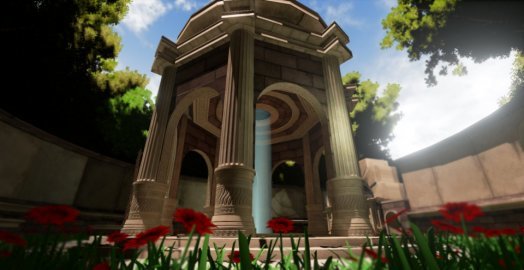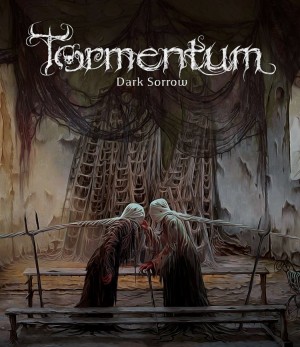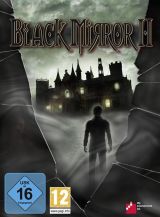Review for Pneuma: Breath of Life

When Myst came along, it basically established (for better or worse, depending on your point of view) the standard thematic template for first-person puzzle-based adventure games, which generally consist of a nameless (and often silent) protagonist who wanders around an unfamiliar and often surreal landscape and futzes around with archaic contraptions to essentially unlock doors. Over the years, the pretenses for unlocking those doors have varied and the presentation has evolved from pre-rendered slideshows to swanky real-time 3D engines, but the basic formula hasn’t changed overly much. This isn’t necessarily a criticism of that style of gameplay; it just depends on how much you enjoy unlocking those doors or how much you care about the reasons for bothering.
Pneuma: Breath of Life is a game where you wander through an unfamiliar and somewhat surreal landscape, futzing about with archaic and obtuse mechanisms, ostensibly to unlock doors. Where Pneuma differs from the standard template is that the nameless protagonist breaks his silence and finally asks “so what the hell’s all this about, anyway?”
The game’s tagline is that you play “as a god”, but that’s actually a bit misleading; Pneuma’s central conceit is actually about perspective. I’ve known a few people in my lifetime who probably considered themselves god-like, and while I can objectively state with a fair bit of confidence that they were not, in fact, gods, from their perspective they obviously perceived the universe revolving around them. Likewise, Pneuma begs the question of how a nameless first-person protagonist would perceive their unfamiliar and surreal world and themselves within it, if we don’t bother with any pretense. If I exist alone without any other context (such as Atrus ordering me around), why wouldn’t I perceive myself as a god?
It’s an interesting premise, but lofty concept notwithstanding, the actual gameplay in Pneuma is a relatively by-the-numbers affair, playing out as a pretty straightforward first-person puzzle game. You take control of the nameless protagonist, progressing through a series of environments, exploring and solving various puzzles, often involving doors and levers and switches and such in order to advance. In keeping with the game’s theme, solving puzzles often relies heavily on the concept of perspective. I won’t go into detail, so as not to spoil too much, but it is an interesting mechanic, even if it feels a bit clunky in execution for some of the puzzles. You’ll often need to either position yourself or maneuver in such a way that you’re viewing the scene (or sometimes not viewing it) from a specific point of view.
While this doesn’t demand any special feats of manual dexterity or reflexes, it does require some basic level of coordination for things like walking backwards and some basic circle-strafing. To that end, the game controls though the familiar first-person mouse/keyboard combo and includes full gamepad support. I tried both options, and they worked equally well. As with most other games of their ilk, it comes down to personal preference.
The problem is that once you get a handle on how the puzzling mechanic works, there’s not really much challenge left. While the puzzles increase a bit in complexity as you progress, they don’t really stray much from the basic formula. I’m not a puzzle-solving savant by any stretch of the imagination; I rather like solving easy puzzles so I can feel good about myself, but even so, after a while I was getting a little bored with them. That’s not to say there’s anything wrong with the puzzles, but there’s likely nothing here that’ll represent any kind of challenge to anyone with a bit of puzzle-solving experience in their repertoire.
The graphics are well-done, if not especially inspiring. The environments primarily consist of a Roman/Greek-styled setting; I don’t really know much about architecture, but suffice to say, there’s lots of steps and columns and courtyards and fountains and such. It all looks rather nice, but I couldn’t help but find it a bit…generic. The world feels lacking in any significant detail or character, and aside from a few bits like water rippling, there’s a severe lack of ambient animations. For instance, it seemed like I could hear the wind very distinctly on several occasions, but the non-descript red banners hanging from the buildings were disconcertingly unmoved. These are minor details, but they add up to make the atmosphere feel a bit sterile. To be fair, I am nitpicking. The visuals are perfectly fine, but in a world where we’ve become spoiled for choice when it comes to such, they feel decidedly workmanlike.
The music is sort of an ethereal, moody electronic score punctuated by the occasional orchestral notes. It’s not bad if you’re into that sort of thing, but more to the point, it feels very much endemic to this type of game, to the point that it almost sounded vaguely reminiscent of the Myst score. But that might have just been the result of my generally tone-deaf ears desperately searching for a musical analogue.
Puzzles and production values are perhaps secondary in this game, in that they exist primarily as a backdrop to the narrative discourse, which is ostensibly the centerpiece of Pneuma. The philosophical quandary of the nameless first-person protagonist unfolds as a narrative voice-over that pops up throughout the game. This isn’t to say that your actions are narrated, so much as the character philosophically rambles throughout, eventually converging on a final bit of self-realization. This basically means that the narrative distills to a very long pseudo-philosophical, existential monologue, and your enjoyment of the game is ultimately going to hinge on your personal tolerance for that sort of thing.
In lesser hands (or voice, rather), this conceit could have been a god-awful (pun intended) experience regardless of your predisposition, but thankfully the actor’s work does a fine job of keeping things relatively entertaining. I wouldn’t go so far as to call it comedic, but it definitely takes a light, whimsical tone, which goes a long way to making the subject matter more palatable (although it could just be the British accent; I’m not the best authority on whimsy).
Admittedly, I have a bit of an inclination for philosophical jibber-jabber, and while I wouldn’t say that I was enthralled with the narration, I was reasonably entertained when I was bothering to pay attention. The problem is that, aside from the beginning and ending portions, the narrative otherwise feels mostly disconnected from the game. Once Pneuma settles into its rhythm, the formula basically distills to: 1) enter a new area, 2) listen to a bit of commentary, 3) solve puzzle to move on, and 4) repeat. It’s not that I was ignoring the narration, but once I entered a new location and saw a puzzle, I instinctively started screwing with it and my mind involuntarily tuned out everything else. It could be that I just can’t walk and chew bubblegum at the same time, but I often felt like I had to make a concerted effort to sit back and listen to the commentary finish before I could continue playing. I assume that the gameplay was supposed to represent the literal journey through my existential morass, but in reality, it usually felt like the story and gameplay were two completely different things that just happened to be occurring at the same time.
Although I admire what Pneuma’s trying (or what I think it’s trying) to say, I tend to be overly critical of games that purport to make some sort of clever meta-commentary on their own nature, but then don’t do anything to elevate the actual gameplay. I suppose it’s an interesting philosophical dilemma of its own. How do you comment on the existential crisis of the first-person adventure game protagonist without ultimately creating a generic first-person adventure game for them to inhabit? Obviously easier said than done, but I would argue that The Stanley Parable has already done as much.
The game plays out over six chapters (as well as a brief prologue and epilogue). Overall, it took me around three hours to complete and my playtimes tend to be a bit on the longer side of average, so it’s not unreasonable to expect that someone with less patience could probably sail through it in closer to two.
Overall, my thoughts on Pneuma: Breath of Life can best be summarized via my own internal monologue as I played through the game:
Chapter 1: “Hmm, this is interesting. I wonder where this is going?”
Chapter 2: “What did he say? I was busy screwing around with the puzzle.”
Chapter 3: “The puzzles are kinda simple. I wonder if they’re going to get any better.”
Chapter 4: “Hmm, I think I see where this is going…”
Chapter 5: “It doesn’t look like the puzzles are going to get any better.”
Chapter 6: “Hmm, that was kinda clever. I wonder what’s on TV?”































